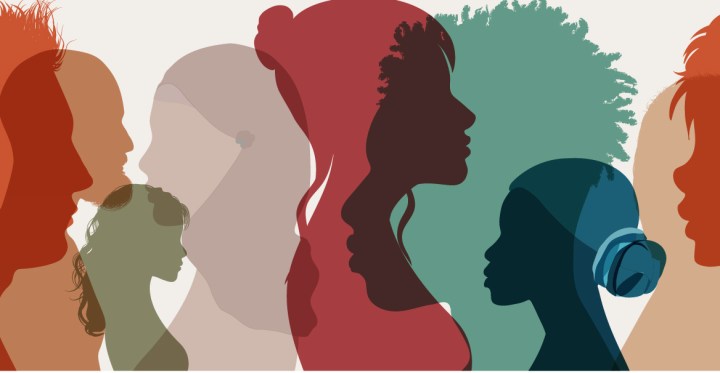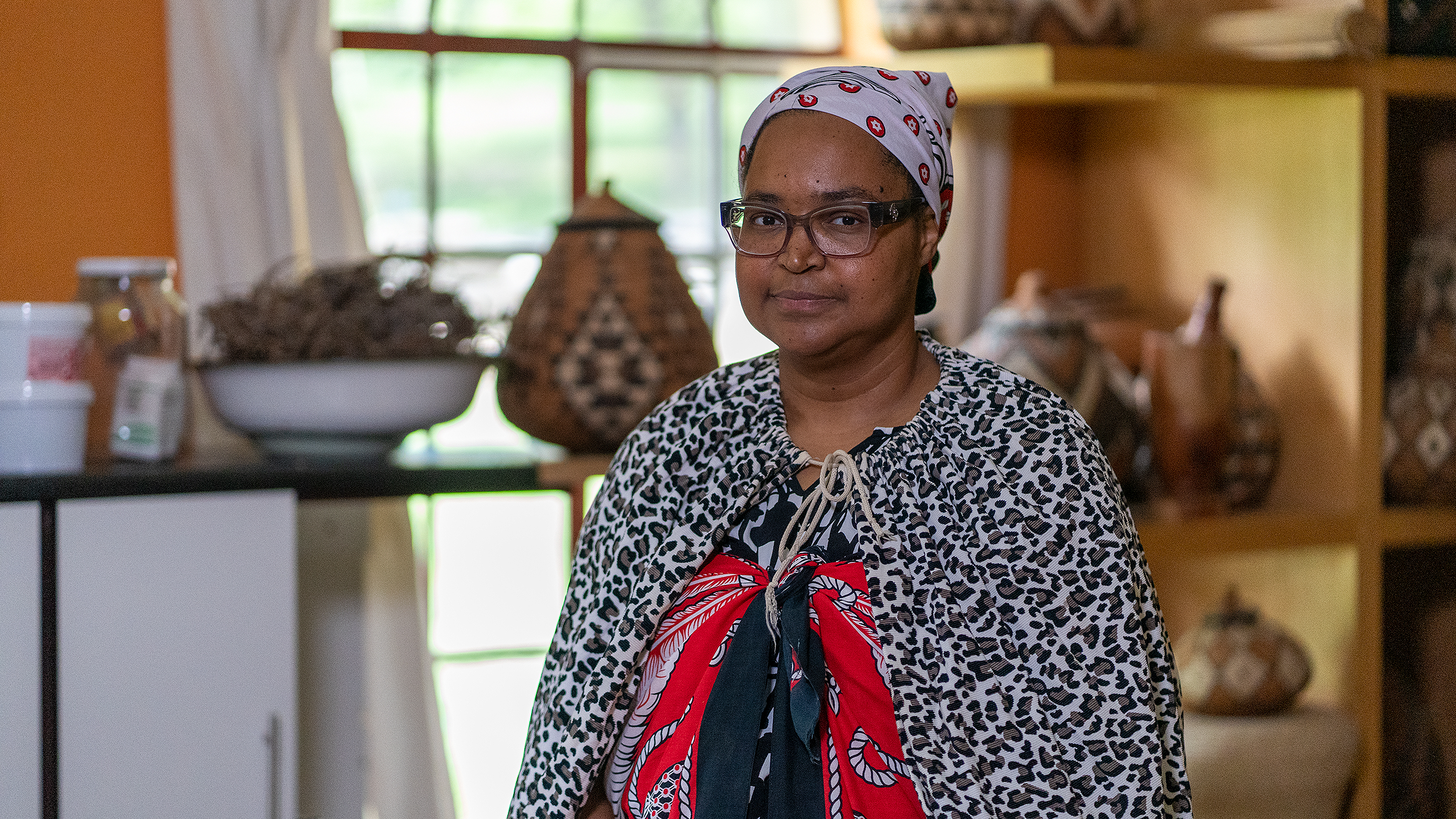THE SPIRITUALS
Talking through grief may be the life support people in mourning need, says sangoma Amanda Gcabashe

We are living through a time of great disconnection, which is affecting our grieving process, but sangoma Amanda Gcabashe throws a bone of hope and says our innate resilience will redeem us.
In her 2015 TEDxJohannesburg Talk, My life as a traditional healer in the 21st Century, Amanda Gcabashe, a sangoma of 21 years, said “people usually remember that there is someone called a sangoma when they have lost all hope and explored all other options”.
Gcabashe learnt this at a young age when, for the first time, her mother found herself in a sangoma’s waiting room with her sisters when she fell chronically ill in 1994. Her mother would later find out from a sangoma in Howick who had addressed her as a peer in the waiting room prior to their consultation that, like Gcabashe’s grandmother, she too had missed her “calling”.
Born in KwaZulu-Natal in 1975 to a white father and Zulu mother, Gcabashe’s spiritual background was varied.
She was subsequently told that her maternal grandmother – a subject she says appeared regularly in the dream visions leading up to her Ukuthwasa – could not follow nor fulfil her calling because she was married to an Anglican priest. Her maternal grandfather was against the process because, in his faith, sangomas were seen as “non-believers”.
But Gcabashe could not ignore the calling. She forged ahead and began her Ukuthwasa – the process of following a teacher or mentor on the journey to fulfilling the calling to become a sangoma – a journey she says became intertwined with her mother’s passing.
“Prior to her passing in 1995, my mother acknowledged she had a calling, but by that time, even when my paternal grandfather conducted the ceremony for her, her time was up and she passed shortly after that ceremony, which is a good thing because at least she would have transitioned having accepted the calling,” reflects Gcabashe.

Amanda Gcabashe. Photo: supplied
Loss and grief have been pervasive throughout Gcabashe’s life, the gravity of which she says she only truly felt for the first time when she lost her uncle in a car accident.
“Loss is something that has been there throughout my life. Just the other day I was reflecting with my sister on the tragic death of one of my favourite Baba omncane, as we say in isiZulu – he was married to my mother’s sister and so would have been considered as one of my fathers instead of an uncle. He died in a terrible car accident when I was nine years old and upon reflecting on how much I adored him, I think that was the first really big loss in my life but which I don’t think was properly acknowledged because you know people tend to think other people are chief mourners.”
A few years later, another car accident claimed Gcabashe’s youngest sister and marred both Gcabashe and her father. Each loss, she considers, affected and changed her life in a different way.
“I had to have a hip replacement several years later as a result of the injuries caused by the car accident in 1988. So loss has been quite pervasive in all of its forms, from the car accidents to losing my parents at a relatively young age. I was 19 years old when I lost my mom.
“I’ve lost a child – I was pregnant with twins and one of them was stillborn. I guess for me, out of all of those losses, except for my Baba omncane, because I was really young when he died, I had some sort of a premonition or warning sign that it was coming,” Gcabashe adds.
Gcabashe believes her calling and living as a sangoma have given her a different perspective on loss and grief through her understanding of the afterlife. Gcabashe divulges that her family has never shied away from feeling emotion, but, she says, the trick is to not dwell in the loss.
“There will be days where you’ll hardly remember the loss and there will be days that it [the loss] will be so acute that it feels like it just happened. It is one of those things you roll with and I think for me that is quite freeing in a way because I am not pressuring myself to get over it. I suppose I have a small advantage in that living like I do as a sangoma, I understand that we don’t just disappear when we die.
“Some moments I can physically feel the presence of the people I have lost so strongly. I think the difficulty is that we get so attached to the physical that even if the non-physical feels a lot more real, we still would wish our lost one was here,” says Gcabashe.
“The memory of my parents and that loss is with me all the time but it is not something I try to run away from. You can’t run away from the emotions of it or the feelings of it.
“The advice I give to people is: grief is forever, grief is a lifetime. It ebbs and flows and it is about how you learn to live with it. It doesn’t get better, you’re always different, you’ll never be the same, and if you understand that from the get-go I do think it makes it a little bit easier because you are not expecting ‘this thing’ to go away but you know you are learning to live with it.”
Gcabashe likens that loss and grief in the context of Covid-19 and the way and rate at which we are losing people to a car accident, in the sense that it is unexpected and often violent as it rips life from a body. However, she believes the real trauma lies in the disconnection Covid has caused between the dead and mourning communities.
“In African cultures, the passing is quite a sacred time. It is an important milestone. It is a rite of passage that we all go through – moving on and transitioning to another level. But carrying out the very controlled, orderly rituals for the dead just hasn’t been possible at the height of Covid. No open coffins, no overnight vigils… and that for me, in a sense, is more traumatic than the actual passing because at the very least when you can observe certain rituals and just talk.
“Talking that happens in those rituals and in the time waiting to bury somebody which is healing. So the space to be able to talk about a life, mourn a life and celebrate a life has been completely obliterated.”
“In our culture as well, in the events preceding the burial there is a lot of injunction in getting stillness and quiet and peace to go with the person who has passed, yet in a lot of cases there was no peace,” she adds.
Gcabashe echoes the advice of rector Terry Lester to not underestimate the healing power of talking through our loss and grief.
“We’re dealing with people who were fine three days ago and then suddenly they’re gone and what that raises in a family, extended family and the community as well. Tragic passings that have not been honoured and mourned sufficiently and mourning require talking and being able to speak, being able to express yourself, being able to rail and get through on the other side where acceptance comes…
“I do think we need to find ways about how do we have that conversation, allow people to express their grief and anger at the sheer unfairness of it all; it is [how] we transition and grow and move beyond.”
Gcabashe, like Rabbi Osher Feldman, says Covid-19 has emphasised the importance of communal support structures and urges us to find our way back to our sense of community, which she believes we lost even before the pandemic.
“There is a term we use, Ukusisa, which is… if I have cows and there is a family in need I will take one of my cows and give it to them so that they are able to sustain themselves and then that family give back my cow, not with interest but when they are ready and [when] they can.
“Those communal support structures, for me, are what Covid has emphasised the importance of. That sense of community, a sense of togetherness, of paying your respects, comforting the family, is all lost and gone with Covid; it becomes more than just the loss of a loved one but the extension of support.”
Gcabashe throws a bone of hope and reminds us that we are an innately resilient bunch and that we need to trust in this sentiment, because even this time of immense tragedy will pass.
“We will have felt pain but it will pass in time and that is what people have to hold on to. In a lot of ways, though, it does require all of us to engage very differently and also start caring about each other… it is not only about you but about your community and it is about bringing back that spirit of Ubuntu, which says ‘I am because you are’.
“Umuntu ngumuntu ngabantu, a person is a person through other people.’ That is how we rebuild our society and go back to some of those values that I think we have let slip… your survival depends on the survival of the other.”
Hand-in-hand with finding our way back to a sense of community, to becoming more collaborative and supportive of each other, Gcabashe says, society needs to relearn that whatever we do has consequences.
“We are part and parcel of the system of nature, we are not outside of it. I do think we have taken for granted that we can do what we want without consequences,” she says.
“People have suffered really badly and what we need to do is to give ourselves comfort that there is always something you can do, including lighting candles and praying for peace for the person who has passed, and praying for peace for yourself and your family so that you learn to let go and slowly, slowly pick up the pieces and move on.” DM/ML



















Thank you for this interesting article. My parents grew up in KZN and this article resonates for me , especially as my grandmother consulted a sangoma once and received incredibly accurate insights which could not have been faked.